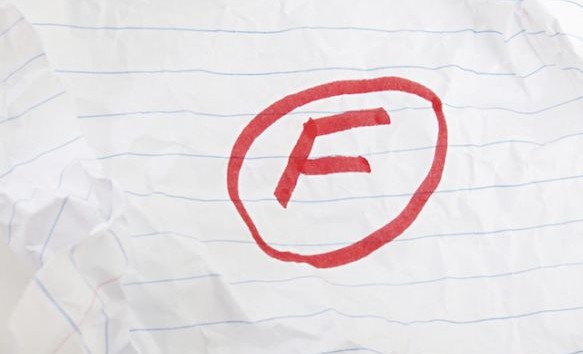Florida public schools: Teachers getting high evaluations in failing schools
Florida has a comprehensive grading system for its public schools. There are eight Assessment-Based Measures in the school grading system. In grades K-8 50% measures student performance and 50% student learning gains. For high schools it is different. Under Florida law (s. 1008.34, F.S.), up to 50 percent of the school grade for high schools is based on certain other components in addition to the assessment: Participation in Accelerated Curricula, Performance in Accelerated Curricula, Graduation Rate, Five-year graduation rate, At-risk Graduation Rate and College Readiness.
For the purpose of this column we only looked at the 2013 K-8 public school grades (elementary and middle school) and compared them to the percentage of teachers in selected schools who received either an Effective or Highly Effective teacher evaluation by their school administration. Florida State Board Rule (FSBR) 6A-5.065 identifies six “essential practices of effective teaching.” They are called The Educator Accomplished Practices. The six essential practices for effective teaching are: Learner Progress, Knowledge of Learners, Instructional Planning, Instructional Delivery and Engagement, Assessment Communication, Professionalism and Learning Environment.
Specifically, we looked at schools graded with a “D” or below. Since 100% of school grades in elementary and middle schools are based upon student performance (knowledge of learners) and student learner gains (learner progress), it follows that school grades are to a large extent based on classroom teacher performance (reflected by their evaluation).
We looked at the percentage of teachers evaluated as either “Effective” or “Highly Effective” and the schools grade. The below list shows the name of the school, percentage of teachers evaluated “Effective” or higher and school grade for 2013:
CHARLES W. DUVAL ELEMENTARY SCHOOL: 100% – D
CHESTER SHELL ELEMENTARY SCHOOL: 100% – F
OSCAR PATTERSON ELEMENTARY MAGNET: 100% – F
BRADFORD MIDDLE SCHOOL: 71% – D (NOTE: 29.0% were found to need improvement)
ENDEAVOUR ELEMENTARY MAGNET: 100% – F
LAUDERDALE MANORS ELEMENTARY: 97.6 – F (NOTE: 2.4% are 3 year developing)
PARKSIDE ELEMENTARY SCHOOL: 100% – F
NOTE: This list is just a sampling of Florida public schools in four different school districts.
Looking at teachers evaluations statewide as of November 25, 2013 the Florida Department of Education reports classroom teacher ratings of: Highly Effective 32.3%, Effective 65.6%, Need Improvement 1.4%, 3-Years Developing 0.6%, Unsatisfactory 0.2% and Percent Not Evaluated 13.7%. Of Florida’s 26,840 teachers: 6,851 were rated Highly Effective, 11,493 Effective, 172 Need Improvement, 32 are 3-Years Developing, only 12 Unsatisfactory and 8,280 were not evaluated.
How can Florida have any school rated C let alone a D or F with 97.9% of our public school teachers rated as Effective or higher?
Educators tend to blame the students or parents. Are failing schools due to failing neighborhoods or do failing schools create failing neighborhoods?
In July Sizi Parker from TakePart.com reported, “Last week, the state’s Board of Education finessed the system, again, for a second year in a row to create an ’emergency safety net.’ That means regardless of how badly a school is performing, it will not be permitted to drop more than one letter grade … As Florida prepares to implement the Common Core State Standards in 2014, the grading system is likely to be completely overhauled.”
Have teacher evaluations become so inflated that they do not reflect the ability to teach? Are teachers failing the students by not being held accountable for the learning of their students? Will teacher evaluation standards be overhauled when Common Core is implemented?
The current Florida teacher evaluation system does not reflect student achievement or growth levels. When will state legislators recognize this disconnect?
RELATED COLUMNS:
Most teachers fare well in year two of new evaluation system
Senate Bill 736: How will it affect me?
Value-Added Model or Measurement (VAM) of Student Growth
How Teachers and ESPs Can Talk About VAM



Teachers are held accountable but are not allowed to use the methods they know are best for their students. Everything is dictated to them from administration. With Common Core it is a one size fits all education regardless of the makeup of the teacher’s class. It is like all football coaches having all decisions made for them by someone higher up in the NFL. Someone else calling all of the plays regardless of the makeup of the team of the opponents. You know what the outcome of that would be!